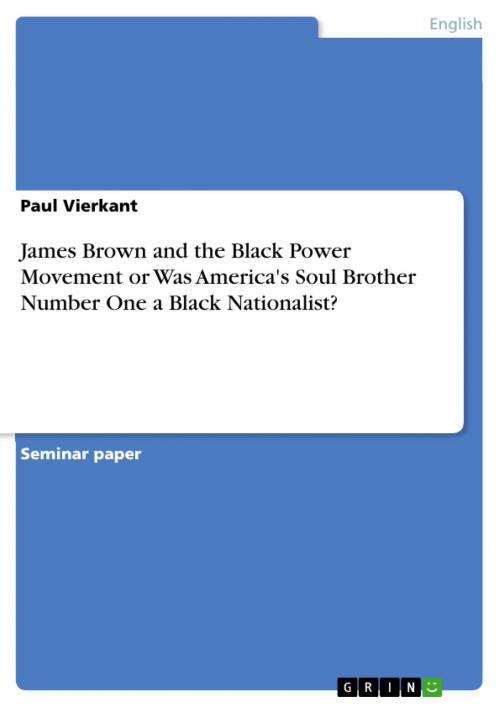James Brown and the Black Power Movement or Was America's Soul Brother Number One a Black Nationalist?
Nonfiction, Entertainment, Drama, Anthologies| Author: | Paul Vierkant | ISBN: | 9783638544740 |
| Publisher: | GRIN Verlag | Publication: | September 13, 2006 |
| Imprint: | GRIN Verlag | Language: | English |
| Author: | Paul Vierkant |
| ISBN: | 9783638544740 |
| Publisher: | GRIN Verlag |
| Publication: | September 13, 2006 |
| Imprint: | GRIN Verlag |
| Language: | English |
Seminar paper from the year 2005 in the subject American Studies - Culture and Applied Geography, grade: 1,7, Free University of Berlin (John F. Kennedy-Institut für Nordamerikastudien), course: The Sixties and the U.S., 39 entries in the bibliography, language: English, abstract: 'The Godfather of soul', 'the hardest working man in show business' or 'Soul Brother Number One', are the various different images of a persona who made a very important contribution to the Black Power Movement. James Brown reached his audience in concert halls and via radio and television. As a musician, performer, and role model, he touched the soul of nearly every black American at a time when Afro-Americans sought to re-define themselves. The time had come to create a black Aesthetic that would reshape the Western cultural sphere. Beside James Brown, Black America saw the rise of other cultural heroes like Muhammad Ali and Shaft. They all contributed in their own way to the black liberation struggle. However, the Black Power Movement did not only consist of a cultural branch but also of political and religious organizations. Figures like Malcolm X and Martin Luther King jr. were charismatic leaders whose importance can not be overstressed. Still, the basis of the Black Power Movement (hereafter BPM) was the individual, the group and the community. The black experience, together with black everyday life was the origin and source of the black struggle. Since James Brown grew up in a southern American black community and knew what this experience meant, he was able to authentically convey this on stage. Beyond his career as a musician, he was also interested in the fate of his people. He was in his own way an active political figure, using his popularity to change the social circumstances for black communities. Furthermore, Brown was one of the first black American musicians to enter the white-dominated world of economics. Although he had never been close to black nationalists, he lived - consciously or unconsciously - their visions in great part. Yet he always stressed his belief in the American Dream and patriotism. Consequently, he can be considered a symbol of black cultural Nationalism and a patriotic American at the same time. It is this dichotomy and ambiguity of James Brown that will be discussed in the following essay.
Seminar paper from the year 2005 in the subject American Studies - Culture and Applied Geography, grade: 1,7, Free University of Berlin (John F. Kennedy-Institut für Nordamerikastudien), course: The Sixties and the U.S., 39 entries in the bibliography, language: English, abstract: 'The Godfather of soul', 'the hardest working man in show business' or 'Soul Brother Number One', are the various different images of a persona who made a very important contribution to the Black Power Movement. James Brown reached his audience in concert halls and via radio and television. As a musician, performer, and role model, he touched the soul of nearly every black American at a time when Afro-Americans sought to re-define themselves. The time had come to create a black Aesthetic that would reshape the Western cultural sphere. Beside James Brown, Black America saw the rise of other cultural heroes like Muhammad Ali and Shaft. They all contributed in their own way to the black liberation struggle. However, the Black Power Movement did not only consist of a cultural branch but also of political and religious organizations. Figures like Malcolm X and Martin Luther King jr. were charismatic leaders whose importance can not be overstressed. Still, the basis of the Black Power Movement (hereafter BPM) was the individual, the group and the community. The black experience, together with black everyday life was the origin and source of the black struggle. Since James Brown grew up in a southern American black community and knew what this experience meant, he was able to authentically convey this on stage. Beyond his career as a musician, he was also interested in the fate of his people. He was in his own way an active political figure, using his popularity to change the social circumstances for black communities. Furthermore, Brown was one of the first black American musicians to enter the white-dominated world of economics. Although he had never been close to black nationalists, he lived - consciously or unconsciously - their visions in great part. Yet he always stressed his belief in the American Dream and patriotism. Consequently, he can be considered a symbol of black cultural Nationalism and a patriotic American at the same time. It is this dichotomy and ambiguity of James Brown that will be discussed in the following essay.















